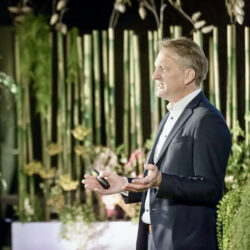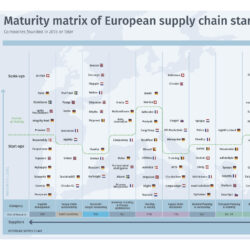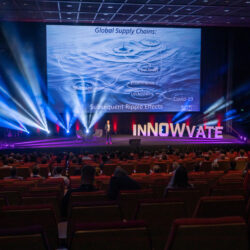The differing approaches to supply chain innovation

Leading companies recognize the absolute necessity of supply chain innovations because of the current turbulent times. However, approaches do vary considerably, as keynote presentations from companies including Lego, PepsiCo, Metro, Versuni and Heineken at the inNOWvate Supply Chain Event in Amsterdam on 22 May showed. ‘Nothing fantastic happens if you don’t take uncomfortable risks,’ futurologist Magnus Lindkvist (pictured) told the audience at the cinema.
By Marcel te Lindert
Since the Russian invasion, hospitality wholesaler Metro Cash & Carry in Ukraine has been facing a 20% staff shortage in its 26 branches, which are normally staffed by more than 3,000 people. Due to the war, many employees have fled, and quite a few colleagues are fighting at the front. In a video message, Olena Vdovychenko, CEO of Metro, talked about introducing cashless shops as a significant innovation: customers now scan their own groceries and pay digitally without the help of cashiers.
Futurologist Magnus Lindkvist reported that the economy has grown exponentially over the centuries. But at the same time, the turbulence index by political scientists Katherine Barbieri and Omar Keshk showed that the world has never been more unsettled than now. Lindkvist made an ardent plea for creating rather than competing. ‘Those who compete end up in a competition. The winner gets a medal, but so too do the losers.’
Circularity
As turbulence has increased, Lego faces the challenge of strengthening its supply chain’s tenacity and resilience. ‘That’s why we have to keep innovating. If we don’t, we will become the Kodak of the toy industry,’ said Carsten Rasmussen, Lego’s COO. Lego is working hard to make its plastic blocks fully circular.
Pierre Mille, until recently Head of Global Supply Chain at Versuni, revealed that this Philips spin-off is busy working on a circular business model. ‘In Brazil, we launched a campaign where we gave money for turning in any air fryer of any brand. That resulted in increased market penetration and tripled sales. The business case is very positive, but behind the scenes, we had to set up processes to disassemble and properly recycle all these air fryers.’
Start-ups and new tools
In a structured search for innovative solutions, food and soft drink producer PepsiCo created an entire ecosystem for start-ups. David Schwartz, Global Vice President Tech Venturing & Innovation at PepsiCo Labs, revealed that 3,000 start-ups have now been evaluated, leading to 200 pilots in plants and distribution. A total of 30 start-ups are now implementing their solutions on a large scale within PepsiCo.
At Heineken, innovation is largely focused on supply chain planning. With the introduction of a central and integrated planning landscape, the multinational with 160 breweries worldwide, born out of many mergers and acquisitions, can make the right business decisions at local level.
‘On top of that, we have created an extra layer where innovation takes place,’ stated Wilko Sierksma, Director of Global Planning at Heineken. ‘We develop specific tools there for specific problems. The starting point is always a “use case”: a concrete problem we want to solve. What we need to do in the supply chain is more sharply define that use case. Then we can build a suitable solution.’










